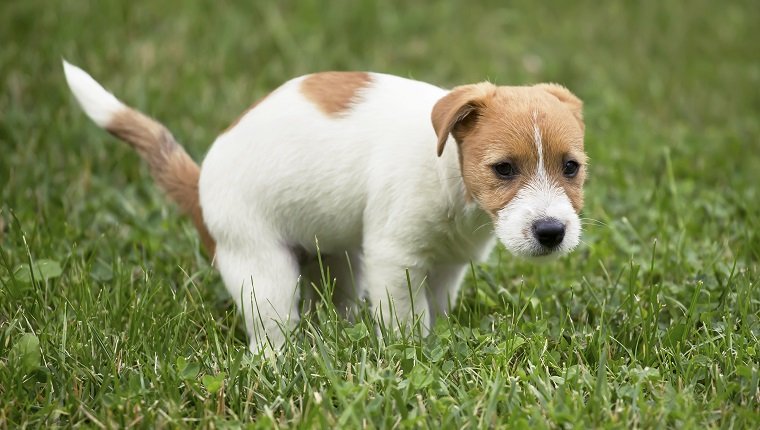
(Picture Credit: Wavetop/Getty Images)
Perhaps one of the most daunting tasks for first-time puppy adopters is housetraining. But experienced dog parents know that our canine friends can learn where to go potty surprisingly quickly, especially if you know how to teach them properly.
The keys to rock-solid housetraining are to start the day your pup comes home and stick with the program. You’ll need to predict when your puppy needs to go, get them outside in time, and then reward them for doing the right thing in the right place. This gets them in the habit of pooping and peeing outdoors.
Adult dogs can also be housetrained, though their needs are a little different. For older dogs, see housetraining adult dogs.
By taking the right steps, you can make housetraining your puppy simple and straightforward, and your rewards will be a cleaner home and a happier dog. Here’s what you should know.
Steps For Housetraining Your Puppy
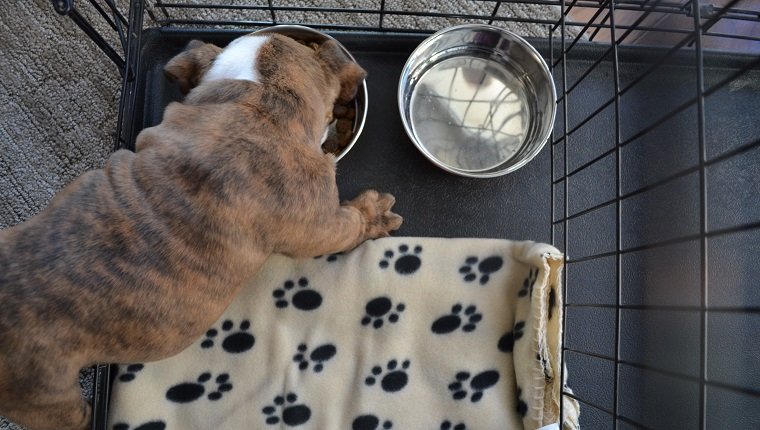
(Picture Credit: CarlyDybka/Getty Images)
You’ll need to stay consistent with training for the first few months of your puppy’s time in their new home before they reliably know where to do their business. Using a crate is the easiest method for housetraining your puppy.
The crate is not a tool for punishment. Instead, think of it as your dog’s bedroom or private space. It provides them with a place to retreat and relax, and it will also give your dog a place to stay comfortably if you leave home.
A crate will prevent your dog from wandering, finding dangerous situations, and having accidents around the house. If you don’t already have one, you should pick up a spacious crate that gives your dog enough room to easily stand, turn fully around, and lie down. It should not be much bigger than that.
Here are the steps you should take for housetraining your puppy once you’ve got a crate:
1. Take Time Off To Housetrain Your Puppy
Housetraining will be quicker and easier if you start as soon as your pup comes home, then stick to it 24 hours a day. That’s one reason experts recommend taking off a week or two from work when you first get your pup.
This time will also help you form lasting bonds with your puppy. If you’re working from home or have some time off work, use that time to start training off the right way.
2. Start Using The Crate The Day You Bring Them Home

(Picture Credit: Ztranger/Getty Images)
Crate training helps dogs learn bladder and bowel control because they don’t like soiling their sleeping and eating areas. That’s why your dog’s crate shouldn’t be too big.
If it’s too spacious, your puppy may feel like they can eliminate in one corner and still keep their living space clean.
Put the crate somewhere in your house where there’s a lot of foot traffic to keep your pup from feeling isolated, and get them used to the noise and bustle of your household. Or get a portable crate you can take with you from room to room.
The crate should not be used to keep your pup “out of sight, out of mind.” Give your puppy lots of breaks to stretch their legs and to play and bond with you; one or two hours at a stretch in the crate is all the time they should be spending there during the day.
3. Take Your Puppy Outside Frequently
Never confine your puppy for longer than they can hold it. If they’re ever forced to go inside the crate because you didn’t let them out in time, you’ve made housetraining much, much harder.
Puppies younger than six months old need at least one midday bathroom break–probably more. So if you work during the day, you’ll need to hire someone to come to your house and let your puppy out.
Every dog is different, and smaller breeds can’t hold it as long as larger ones. If your pup soils their crate, then that may be a signal that they need more frequent bathroom breaks.
A general rule of thumb is that a puppy can hold it for as many hours as they are months old, plus one. So for a three-month-old pup, that’s four hours.
You should also give them a bathroom run after they eat or drink, wake up from a nap, or finish a play session–all times when they’re likely to go. Also, take them out first thing in the morning and last thing at night.
And always watch for warning signs that they need to go. Clues include whining, pacing, circling, or sniffing the ground. If you see any of these distress signals, take your pup outside right away.
4. Stay Consistent Outside
(Picture Credit: Carlo Van Stek / EyeEm/Getty Images)
Use the same “elimination station” each time you take your puppy out for potty breaks. Dogs develop a preference for pooping and peeing in the same spots. Make it easier on yourself by choosing, right from the start, the place close by where you want them to go.
Don’t distract your puppy with games and chit-chat; just stand still and let them circle and sniff.
As soon as your puppy begins to go, give them a command, such as, “Go potty” or “Do your business.” Before long, your puppy will eliminate on cue–a handy skill when you’re traveling or don’t want to spend your walks carrying a bag of poop.
Take your puppy back to the crate if they don’t eliminate within a few minutes. Give them some water, and try again in 15 minutes to a half hour or so.
5. Shower Them With Treats And Praise When They Do A Good Job
Make sure treats and praise come right after your puppy finishes eliminating, and make the praise enthusiastic and the food treat top-notch.
You want to make it crystal clear that eliminating outside is a great thing. Don’t wait to get back to the house to give your puppy their treat; they won’t connect the reward with what prompted it.
Important: Take your puppy for a walk or give them some playtime as a bonus reward. If they always come straight back inside after eliminating, they’ll learn to hold it to prolong their time outdoors.
6. Plan A Middle-Of-The-Night Potty Run
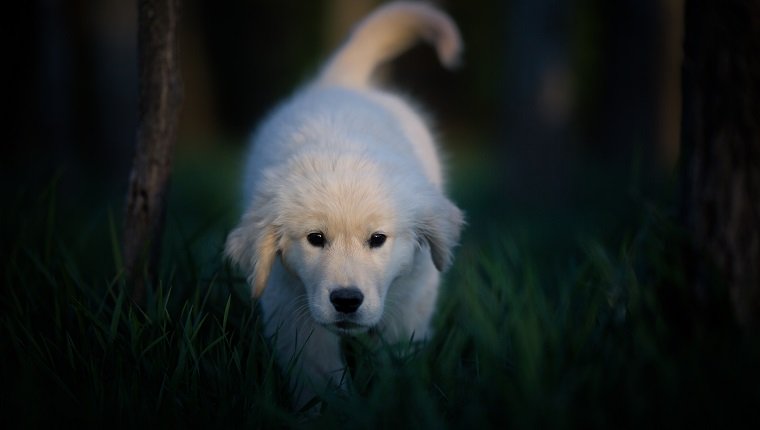
(Picture Credit: MATTHEW PALMER/Getty Images)
Puppies younger than four months will need a midnight potty break, so set your alarm.
Keep nighttime bathroom runs calm and matter-of-fact, so your pup doesn’t think it’s playtime.
If this isn’t enough to keep your dog from having accidents in the night, consider limiting their water intake during the few hours before bedtime.
7. Clean Up Accidents Right Away
Accidents happen, even if you’re the best dog parent in the world. It’s important that you clean these up quickly and thoroughly so your puppy doesn’t feel drawn back to the same place by the smell of residual poop or urine.
Use a cleaning product that contains live bacteria or enzymes that break down the mess, rather than masking it with another fragrance.
You may want to try leaving some soiled towels in your puppy’s “elimination station.” The scent reinforces for your puppy that this is the potty area.
A Few Don’ts When It Comes To Housetraining
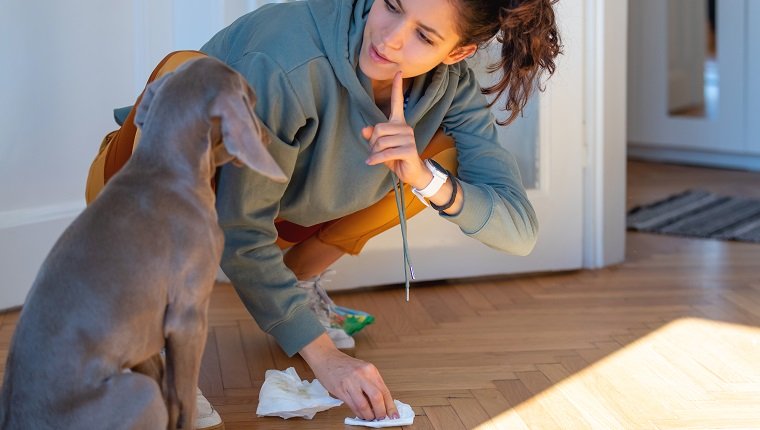
(Picture Credit: zoranm/Getty Images)
Now that you know what steps to take, there are some things you should also know not to do when housetraining your puppy. Mistakes at this early stage can lead to quite a few setbacks and prevent your dog from learning.
Some mistakes can even cause harm to your puppy that might last for the rest of their life.
Here are a few don’ts when housetraining your pup:
1. Don’t Reprimand Your Puppy If You Didn’t Catch Them In The Act
If you come home to find that your puppy had an accident, do not punish them. They will not connect their behavior with the punishment, so they won’t learn what they did wrong.
In fact, your puppy may think you have a problem with poop and pee in general, which could lead to them feeling anxious about going potty at all. Or they could develop neurotic behaviors like eating poop to hide it from you.
If you catch your puppy having an accident, startle them midstream with a quick shout or clap, and then hustle them outside to finish the job. Praise them when they’re done so they learn that eliminating outside isn’t just allowed, it’s generously rewarded.
2. Don’t Clean Up Accidents With The Wrong Cleaners
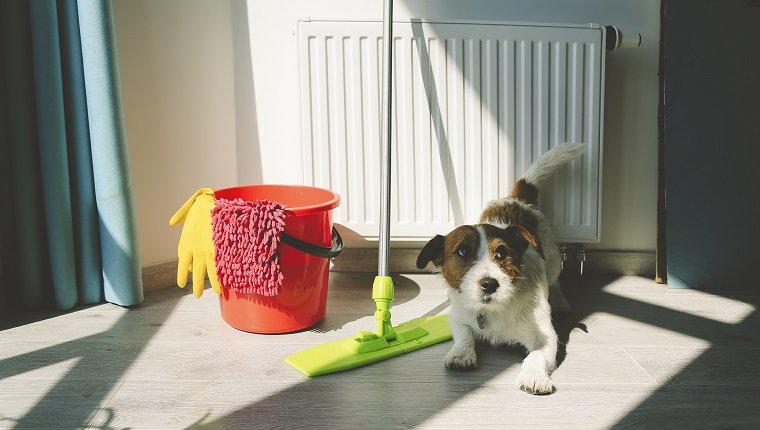
(Picture Credit: Iuliia Bondar/Getty Images)
As mentioned before, your puppy will have accidents. Clean them up with a product that contains live bacteria or enzymes, and make sure the ingredients are dog safe.
Stay away from ammonia-based cleaners; they’ll smell like urine to your puppy, and they’ll want to pee again on the same spot.
Also, stay away from products that contain bleach or harsh chemicals. These can harm your puppy.
3. Don’t Use Punishment
There are a lot of misconceptions when it comes to reprimanding your dog. Punishment is rarely effective, and it’s certainly not as valuable for learning as positive reinforcement.
Don’t push and rub your dog’s nose in the spot where they have an accident. This old wives’ tale doesn’t work.
Don’t yell at your dog. If they’re going potty where they shouldn’t, then only give a quick, sharp shout when you’ve caught them mid-act. The yell is meant to startle them into stopping, not to verbally punish them for the accident.
Don’t smack your dog with a newspaper or throw them outside. This should go without saying. Harsh punishments only harm your bond and do not work for teaching good behavior.
Why Isn’t Housetraining Working?
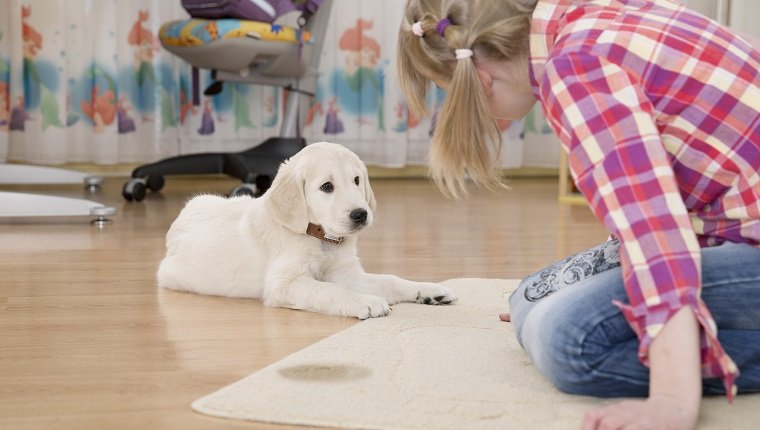
(Picture Credit: alexsokolov/Getty Images)
When it comes to housetraining, you must have patience. Not all dogs learn at the same pace, and puppies can take several months before they consistently go potty where they’re supposed to.
Remember that your puppy isn’t punishing you, nor are they necessarily a slow learner if they have accidents. You may simply have missed their signs that it was time to go.
However if you feel that housetraining isn’t working despite your best efforts, then there may be something wrong. Here are a few common issues that hinder housetraining:
1. Health Problems
Many health issues can result in dogs peeing or pooping more than usual, and other medical conditions prevent dogs from going potty enough. It’s not uncommon for a urinary tract infection or some other ailment to make housetraining next to impossible.
Keep up with regular vet visits to detect any health concerns early. If you’re having serious housetraining problems, ask your vet to check your puppy’s health.
2. Too Much Water
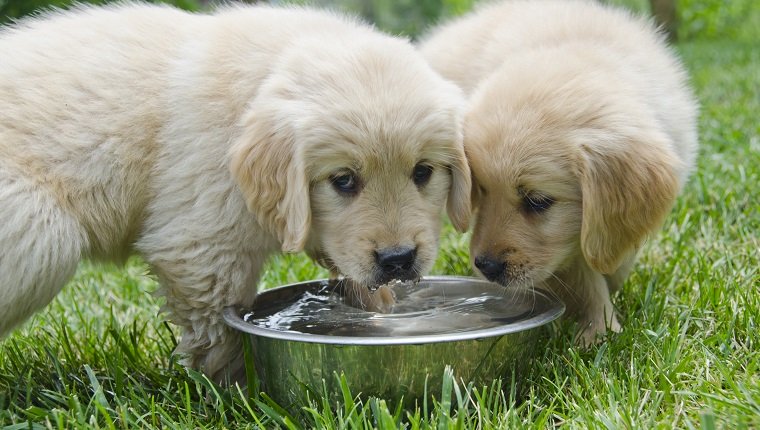
(Picture Credit: chapin31/Getty Images)
Your puppy may drink too much water and have to pee more frequently than they should. This may especially be true if your puppy drinks water before bed and has accidents at night.
That said, don’t limit your dog’s access to water right away. You don’t want to risk dehydration.
Instead, ask your vet for recommendations on how much water your dog needs. Individual puppies can vary in breed and size, so they often need different amounts of water to stay hydrated.
3. Being Too Relaxed On The Rules
While you shouldn’t punish your puppy for accidents, you shouldn’t coddle them too much either. For example, if you carry your dog outside like a baby instead of walking them out, they may refuse to go outside unless you hold them.
Also, if you bring your dog inside and reward them when they haven’t done their business outside–either with treats or lots of free time outside of the crate–then they’ll come inside with a full bladder and no incentive to go potty outdoors.
Don’t cave in! If your dog hasn’t gone to the bathroom after a few minutes outside, preferably on leash, return them to their crate and try again later.
4. Not Supervising

(Picture Credit: Stephanie Verhart/Getty Images)
If your puppy goes through most of the day unsupervised and outside of the crate, then they’re bound to have accidents. There’s no one around to catch them in the act or read the signs that they need to go out.
Supervise your puppy as much as possible. Do not give them free access to all areas of your home if you can’t watch them. Limit your puppy to the room or area of the house where you can see them.
5. Learning To Go In The Wrong Place
As mentioned before, many dogs like to go potty in the same place over and over again. That’s great if your puppy’s potty area is outside, but not so great if they’ve learned to go inside the house.
If this is the case, then it may take longer for you to convince your pup to go outside again. After all, wouldn’t you find it hard to use an outhouse after years of indoor plumbing?
The solution for this problem is to make sure your puppy has no access whatsoever to the area they’re using as their toilet. Gate it off, close a door if you can, or watch your puppy like a hawk.
If your puppy consistently eliminates in their crate, this usually happens because a puppy was somehow forced to pee or poop in their living quarters. Maybe they were trapped in a crate for too long before you adopted them.
Puppies with this type of background often do best if you forego the crate and tether them either to you or to an object near you with a short leash during the day. You should double the frequency of your trips outside.
Most of all, remember to have patience, both for your puppy and for yourself. If all else fails, consult your vet and a professional trainer for advice. Almost every puppy can learn to be housetrained when their humans follow the right steps.
Have you ever housetrained a puppy? Do you have any expert tips? Let us know in the comments below!
Click the bold links in the article to support our content! DogTime participates in the Chewy Affiliate Program designed to provide a means for sites to earn fees by advertising and linking to Chewy.com.